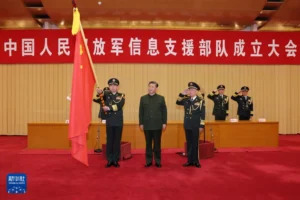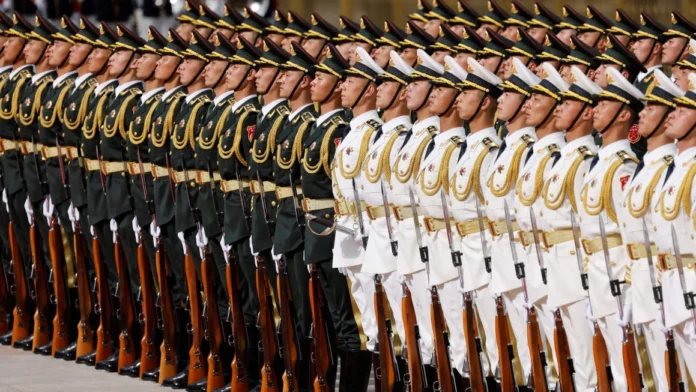China has rolled out the largest restructuring of its military in almost a decade, focusing on technology-driven strategic forces equipped for modern warfare, as Beijing vies with Washington for military primacy in a region rife with geopolitical tensions.
In a surprise move last week, Chinese leader Xi Jinping scrapped the Strategic Support Force (SSF), a military branch he created in 2015 to integrate the People’s Liberation Army’s space, cyber, electronic and psychological warfare capabilities as part of a sweeping overhaul of the armed forces.
In its place, Xi inaugurated the Information Support Force, which he said was “a brand-new strategic arm of the PLA and a key underpinning of coordinated development and application of the network information system.”
The new force would play an important role in helping the Chinese military “fight and win in modern warfare,” he said at a ceremony last Friday.
At a news conference on the same day, a spokesperson for China’s Defense Ministry appeared to suggest the SSF was effectively broken into three units – the Information Support Force, the Aerospace Force and the Cyberspace Force – which will answer directly to the Central Military Commission, the body at the top of the military chain of command headed by Xi.
Under the new structure, the PLA now consists of four services – the army, navy, air force and the rocket force – plus four arms: the three units spun off from the SSF and the Joint Logistic Support Force, according to ministry spokesperson Wu Qian.

Experts on the Chinese military say the reorganization enhances Xi’s direct control over the PLA’s strategic capabilities and underscores China’s ambitions in better mastering AI and other new technologies to prepare for what it calls the “intelligentized warfare” of the future.
The restructuring follows Xi’s sweeping corruption purge of the PLA last year, which ensnared powerful generals and shook up the rocket force, an elite branch overseeing China’s fast-expanding arsenal of nuclear and ballistic missiles.
The Information Support Force will be led by top generals from the now-defunct SSF.
SSF deputy commander Bi Yi was appointed commander of the new unit, while Li Wei, the SSF’s political commissar, will take the same role in the Information Support Force, according to state-run news agency Xinhua.
There was no mention of any new appointment for SSF commander Ju Qiansheng, who last year spurred speculation when he disappeared from public view amid a flurry of military purges before eventually resurfacing at a conference in late January.




